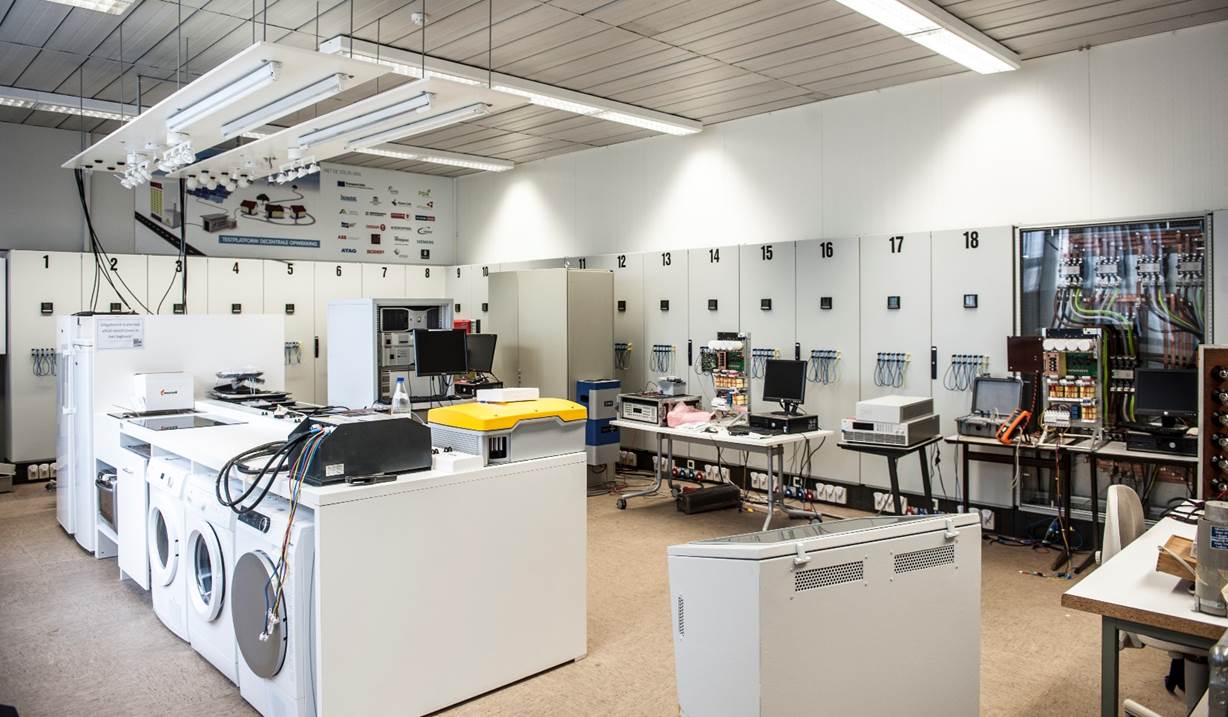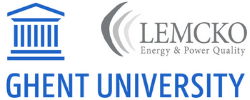
Photo by Lemcko |
Country: Belgium |  |
||
| Submit Testing/Consulting Request | ||||
Description: Lemcko was founded in 1998 as an independent academic research institute focusing on electrical motors, drives and electrical power quality to provide substantial research for its industrial partners. Since then, there has been a continuous growth in manpower, knowledge and expertise in low frequent power quality (<2kHz), general low voltage electrical installations, energy-efficiency and renewable energy connected to the low voltage distribution grid. In 2013, Lemcko has become part of the University of Ghent in order to increase academic collaborations and its international recognition. Over the last two decades, the functionality and the stress on the distribution grid has significantly increased. Lemcko’s ambition is not to elaborate on advanced theoretical modeling or forecasting algorithms but instead to facilitate the transition from innovative academic research to real-life integration of these innovations into the low-voltage grid. The laboratory comprises an extensive amount of practical and theoretical knowledge in combination with a state-of-the-art test facility. Lemcko has a unique test site consisting of 18 real connections of households to an actual distribution feeder of 600m. The combinational use of the distribution grid and a 240kVA programmable power source enables testing of innovative consumers and producers as well as measuring equipment in order to tackle future problems related to the practical integration proactively. In electrotechnical engineering the evaluated frequencies are often limited to the 40th harmonic (or 2kHz). However, recent studies indicate that future problems to distributional grids may include supraharmonics (>2kHz) and electromagnetic compatibility and immunity (>9kHz). The laboratory has expanded its area of application, the test equipment and its expertise to cover these frequency ranges. The availability of a semi-anechoic chamber and the corresponding measuring equipment allows Lemcko to perform IEC and CISPR compliance testing.
It is, however, the lack of power as in voltage dips or short- or long-term blackouts that may affect the end user most noticeably. In 2012, Lemcko initiated research focusing on small-scale storage and autonomous generation of electrical power. Test facilities include a free-programmable power electronic converter (Tri-phase platform), 10kWp PV installation with tracking possibilities, net interactive PV converters in combination with battery storage and several autonomous generators. Future investments include a test facility for motor and generator testing of 150kW. This would allow for the possibility to test high power, high current as well as low speed generators such as the ones used in windmills 100kW.
Last year in 2018 the lab was expanded with a storage system in which different battery technologies (10kWh each with a C-rate from 0.5 to 3), combined with supercap storage (2F) and a CHP emulator (50kVA) on a DC bus are connected. This was then connected to the distribution network with a DC / AC inverter (160kVA). The purpose of this emulator is to investigate what the dynamic possibilities of storage are and how different technologies can be linked to each other and operate in a stable way.
Main Research Fields:
- Computational and simulation tools for power systems
- Transmission and distribution planning and operation
- Energy efficiency and power quality
- Energy interfacing with power electronic devices
- Renewable energy control and integration
- Optimal planning, control and operation of wind and PV farms
- Electricity markets
- Wave energy
- Wide-area control using PMUs
- Contribution of distributed generation to ancillary services
Facilities:
Direct Drive Electrical Generator
In October 2017, the functional testing of an innovative generator has started, as the result of a unique cooperation between the young and innovative company Magnax and Ghent University. The device belongs to the type of electromechanical converter systems without a gear box, so called direct drive systems, which do not comprise a gear box but do put challenging requirements on the electrical generator, as the latter will need to handle fluctuating movements having a high torque (several 10-100 kNm) and a low speed (10-100 rpm).
The newly realised type of a direct drive electrical generator reaches 100 kW power and 16 kNm torque, with a shaft length of only 14 cm and a weight of 850 kg, which is about 5 times smaller/lighter compared to other machines. As mentioned, it avoids a heavy and bulky gearbox. Moreover, the targeted efficiency of the machine is 96%, and evenly important, this efficiency is targeted over a large range of operating conditions (speed and torque variations) as is required in many applications. The machine developed during the last two years includes patented knowledge. Furthermore, for the detailed electromagnetic design of the machine, Magnax could rely on the know-how from the team of prof. Sergeant (Ghent University-Flanders Make) built up in many research projects supported by FWO, IWT and IOF. Currently, the tests are being performed by the team of prof. Jan Desmet (Ghent University) at Ghent University campus Kortrijk on a unique, brand new testrig that will be officially inaugurated later this year.
Though developed for renewable energy generation, other applications where the machine operates as a motor or generator are targeted: heavy duty vehicles, elevators, production machines and more.
More information is given in this video:
Some numbers:
- Low Speed: down to 30 rpm
- High Speed: up to 6000 rpm
- High Power: up to 200 kVA
- High Dynamic: up to 5 ms
- High Performance: < 0,5%
- High Torque: up to 50kNm

EELAB
In Lemcko’s laboratory EELAB, a testbench with 4-quadrant regenerative drive and gearbox is installed. It reaches power scales of up to 150kW, speed ranges of up to 6000rpm and maximum torques of 45kNm. It is capable to:
- emulate wind turbines,
- work with co-generation applications and
- test the electrical specifications of rotating electrical machines.
Testing Services:
- Condition monitoring
- Vibration analysis
- Motor current signature analysis
EMC Testing:
- Pre- and full-compliance testing in lab
- Pre-compliance testing on large machines in-situ
- Troubleshooting
- Advice on EMC-aware design
Standards Compliance:
Lemcko owns the Certificate of ISO 10816 vibration expert Cat. III.
last updated: 16.11.2017

